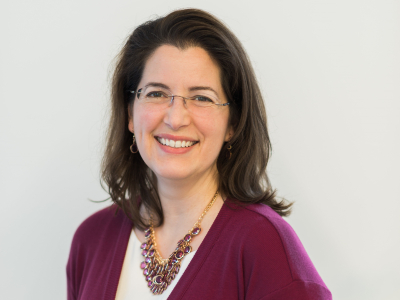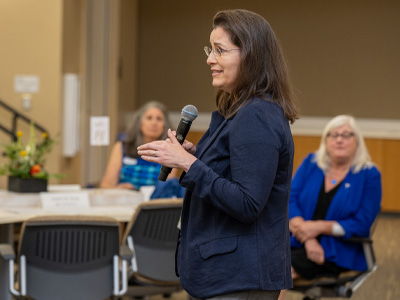Betty Irene Moore Fellow receives Catalyst Award from National Academy of Medicine
Award provides $50,000 for research projects focused on improving healthy longevity
Oct. 23, 2023
By Megan Hansen
 Betty Irene Moore Fellow Kristen Fessele received the Catalyst Award from National Academy of Medicine.
Betty Irene Moore Fellow Kristen Fessele received the Catalyst Award from National Academy of Medicine.
Encouraging physical activity in older cancer survivors is a highly personal endeavor for Betty Irene Moore Fellow Kristen Fessele. Witnessing her mother’s struggles after a cancer diagnosis inspired her to change her field of study to focus on helping people experiencing cancer thrive after treatment.
She received a $50,000 Healthy Longevity Catalyst Award this month from the National Academy of Medicine to advance her research on this topic.
Fessele, a 2022 cohort fellow and senior nurse scientist at the Memorial Sloan Kettering Cancer Center, is among the 20 innovators selected nationwide from more than 500 applicants who submitted their projects for consideration. Awardees come from a variety of disciplines, such as science, medicine, health, technology, finance and social sciences. Their projects each address innovative and healthy ways to extend the human lifespan and improve health as people age.
"I am deeply honored to receive this award, and I am eager to augment my fellowship research project with the seed funding from the Catalyst Award to help older adults return to good health more quickly after cancer treatment,” Fessele said.
Helping older adults thrive after cancer treatment
Fessele’s project, “Voice-first, multimodal interface for post-treatment geriatric assessment and tailored digital health promotion education for older adults with cancer,” expands upon the research she is conducting as part of her project with the Betty Irene Moore Fellowship for Nurse Leaders and Innovators. Both research endeavors are centered around crafting a health promotion intervention that is delivered through a voice-activated system to older adults in the initial months following the completion of cancer treatment.
“My project aims to develop an intervention to increase physical activity among older adults diagnosed with cancer that can ultimately produce functional and cognitive improvements and delay frailty,” Fessele said. “Everyone deserves to be supported on their cancer recovery journey with tools and information that can help increase wellness and develop resilience.”
Putting convocation lessons into practice
 Kristen Fessele discussed her research project at Convocation 2023 in Sacramento, California.
Kristen Fessele discussed her research project at Convocation 2023 in Sacramento, California.
It wasn’t until the fellowship’s annual convocation that Fessele was first exposed to human-centered design, a concept she is now passionate about and has incorporated into her fellowship project.
“The generous support from the fellowship has allowed me to collaborate with Dr. Andrea Cuadra, a human-computer interaction specialist at Stanford University, to develop a voice-first frailty assessment and education system we’ll be testing in 2024. We are dedicated to creating inclusive, accessible digital health solutions through human-centered design methods and we have involved older adults throughout the project process.”
Heather M. Young, fellowship national program director, said she is thrilled to see Fessele’s important research recognized with additional funding.
“Innovation in healthy aging is the impetus behind the Catalyst Award. Dr. Fessele’s project is an ideal example of the intersection of health care, technology and innovation to advance the care people receive later on in life as they experience health challenges,” Young said.
Awards are part of a multiyear competition
The Healthy Longevity Catalyst Award is part of the National Academy of Medicine’s Healthy Longevity Global Competition, which provides funding to people worldwide for innovative and bold research that has the potential to dramatically improve health as people age. The multiyear competition consists of three progressive phases during which innovators compete for increasingly larger awards at the Catalyst, Accelerator and Grand Prize levels, with the latter being funding of up to $5 million.
As Fessele makes progress on her research project, she becomes eligible for support in the second phase of the competition – the Accelerator Award. She is also invited to attend the annual virtual Innovator Summit in fall 2024 to share her work with policymakers, researchers, potential investors and fellow innovators from around the world.
“I am looking forward to sharing my intervention on the global stage and to increasing awareness and funding for this significant issue that is close to my heart,” Fessele said.





